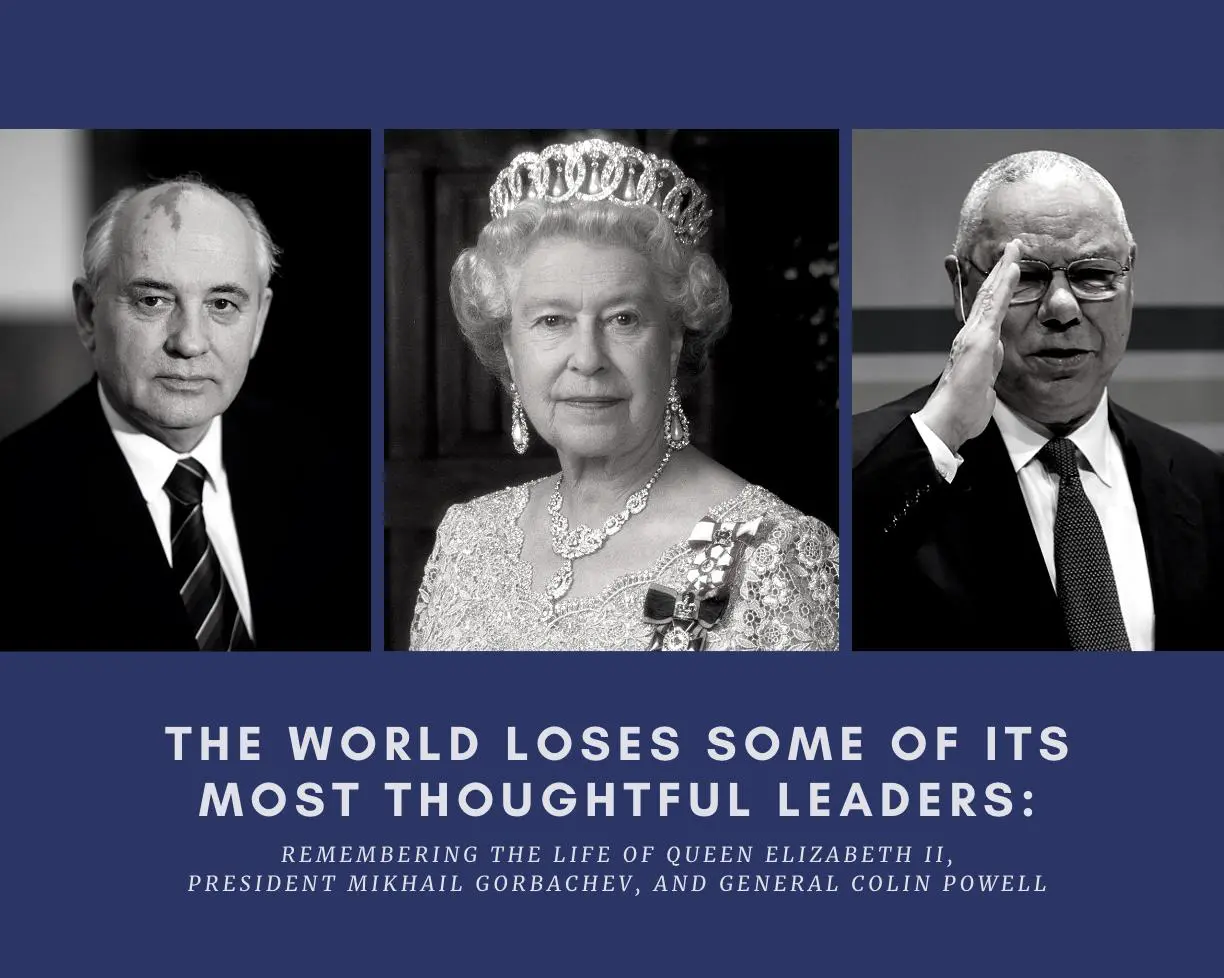It should be lost on nobody who follows international affairs, that we have lost some of the great leaders of our time in the passing of Queen Elizabeth II, President Mikhail Gorbachev, and General Colin Powell.
Queen Elizabeth II. Queen Elizabeth II’s passing on September 8, 2022 marked the end of the longest reign of a female monarch in world history, and the longest reign of any British monarch at 70 years, 214 days. But more important than the duration of her reign was her ability to transition the relationship between the monarchy and the government of the United Kingdom. Queen Elizabeth carefully balanced her role as head of state with the prime minister’s role as head of government. She served her country as a mechanic and driver in World War II, enlisting at 18 years of age and setting an example for her subjects. But the most important accomplishment of the Queen was her consistency of message and leadership as the Monarch. Prior to her reign, her father reluctantly accepted his position as King after her uncle abdicated the throne for personal reasons throwing the crown into a position which could have led to its downfall as the nation found itself in peril during World War II.
President Mikhail Gorbachev. President Mikhail Gorbachev (Михаил Горбачёв ) passed away on August 30, 2022. He served as President of the Soviet Union from 1990-1991, promoting his reform policy of glasnost “openness” and perestroika “restructuring” with an aim to de-centralize economic decision making in order to improve its efficiency. By leading the dissolution of the Soviet Union, he was considered a leader in ending the Cold War and received the Nobel Peace Prize. But the weakening of Russia after the dissolution of the Soviet Union brought him much criticism as well.
Mikhail was born on March 2, 1931 into humble beginnings in Privolnoye which was divided almost evenly between ethnic Russians and ethnic Ukrainians. Gorbachev’s paternal family were ethnic Russians from Voronezh and his maternal family were of ethnic Ukrainian heritage from Chernihiv. His parents were poor peasants. He attended Moscow State University, married a fellow student and then graduated with a law degree in 1955.
Gorbachev worked his way up through the Politburo and had a more open leadership style and would speak to civilians on the street. He encouraged open discussion in Politburo meetings. His closest advisor was his wife who he took on as an unofficial “First Lady”. Gorbachev promoted Boris Yeltsin, who was made a Secretary of the Central Committee in 1985 and later served as the last President of the Soviet Union.
Coming from poverty, he later saw what wealth looked like. This might have influenced his thinking regarding the strengths of capitalism. Perhaps this made him more open to dialogue with the West, including UK’s Prime Minister Margaret Thatcher and the US President Ronald Reagan.
By introducing free elections and creating parliamentary institutions, Gorbachev laid the groundwork for democracy. In 2017, Gorbachev, said, “Russia can succeed only through democracy. Russia is ready for political competition, a real multiparty system, fair elections, and regular rotation of government. This should define the role and responsibility of the president.”
Former Germany chancellor Angela Merkel grew up in East Germany and said that Gorbachev changed her world. Surely his reforms paved a path that enabled her leadership course.
General Colin Powell. General Colin Powell passed away on October 18, 2021. General Powell served as the National Security Advisor to President Reagan; the Chairman of the Joint Chiefs of Staff under Presidents George H.W. Bush and Clinton and Secretary of State under President George W. Bush.
General Powell famously issued the “Powell Doctrine”, a follow-on from the Weinberger Doctrine, where he emphasized focusing on national security interests before considering military operations. The doctrine also emphasized overwhelming strike capability and ground forces with a strong emphasis on public support. All these elements must be in place before military force was used.
Powell learned, and applied, the lessons learned from his experience in Vietnam and Panama. Additionally, he spent considerable time assessing the Korean War and emphasized a “Never Again vs Limited War” policy.
General Powell was the very essence of a pure patriot and grand gentlemen. In my many conversations with him, he always had a sparkle in his eye, a lesson to offer and somehow find a way to learn something from the person he was talking to. He understood geopolitics as few others. And he understood the impact his name and reputation had on serious situations and organizations around the globe.
Several dozen schools were named after General Powell over the past decades, which he commented to me in our final meeting, was one of the great honors of his life.





